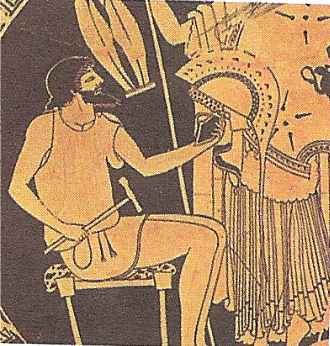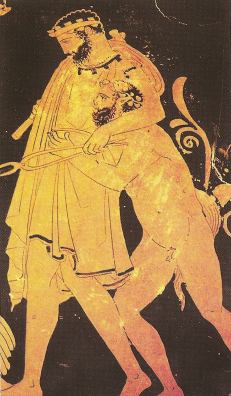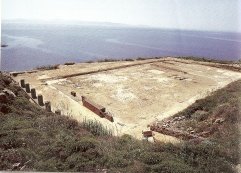Hephaestus, the First Craftsman
It is obvious that the ancient Greeks sought to interpret the volcanic origins of the Aegean islands and volcanic activity in general, by creating a god of fire. This is in line with their conviction that volcanic eruptions were caused by something that had fallen from the sky. This also explains the fact that all versions of the myths surrounding Hephaestus's birth and subsequent life, contain the incident of the god being tossed or hurled from Mount Olympus by his mother Hera or his father Zeus. In addition,to account for the fact that volcanoes are not always active, in their myths about the god of fire, they conceived the idea that Hephaestus did not always live in exile, but occasionaly returned to Mount Olympus.
The god's relationships with other Olympians
The god's birthHomer informs us that Hephaestus was the legal son of Zeus and Hera. According to Hesiod, however, Hera gave birth to him by herself because she had quarelled with Zeus.According to one version, the fire god was born a cripple;unable to cope with his handicap, his mother tossed the infant into the sea, where Thetis and Eurynome raised him. Thus hidden, the lame god secretly practiced the art of metalworking and made Achille's shield at the request of his mother, Thetis. There is another account, to explain the god's deformity: Zeus became angered when Hephaetus took his mother's side during one of the many quarrels of the divine couple, so he grabbed poor Hephaetus by the foot and hurled him into the Aegean. As a result of the severe fall, he became a cripple. The god landed on the island of Lemnos, whose inhabitants took care of him and later worshipped him, by building a large temple on the island, dedicated to him. The god's relationships with other Olympians
The god's childrenUnlike the rest of his Olympian counterparts, Hephaestus did not father may children, due to his lack of romantic adventures.According to some ancient writers, Eros was the son of Hephaestus and Aphrodite, although other texts claim that he was the son of Zeus or Hermes or Ares. The Cabeiri of Samothrace, are believed to be the god's children or grandchildren from the nymph Cabeiro. The following are believed to be other children:
The god's Cult
As fire god, Hephaestus was also considered to be the great metalworker who built grand and impressive objects, like Helius's chariot, Hercules's golden breastplate, Diomedes's breastplate, Achilles's armor and shield, Zeus's scepter and throne, the arrows of Apollo and Artemis and finally the gold chalices of Helius, Dionysus and other gods. He built a bronze palace on Mount Olympus for the gods, while for himself he made gold robot-statues that could speak and think to serve him. He also built Talus, a giant robot that he gave Minos, the legendary king of Crete, to patrol the shores of his island kingdom. Various myths claim that the god's workshop was on the island of Lemnos, which was his primary place of worship. The temple on the island was believed to have been built on the exact spot where a lightning bolt struck the earth. The Hephaestia were rituals which were dedicated to the god and took place each year on the island: for nine days, all the fires on the island were lit with the new flame that was brought by boat from the sanctuary on the island of Delos. As the frontiers of the Greek world were expanded in colonies, myths tell that the god established a second workshop at Mount Aetna, in Sicily. Besides Lemnos and Sicily, the god was said to be also worshipped in Athens. In his temple, known as the Hephaestion, there were statues of both him and Athena. Athenians held torch races known as Hephaestia, in honor of the two gods.
Return from Hephaestus to Greek Pantheon
|
||||
Resource MaterialClassroom MaterialMovies,DVDs, Games and BooksAbout the SiteYour Stories |
||||
|
|
||||









